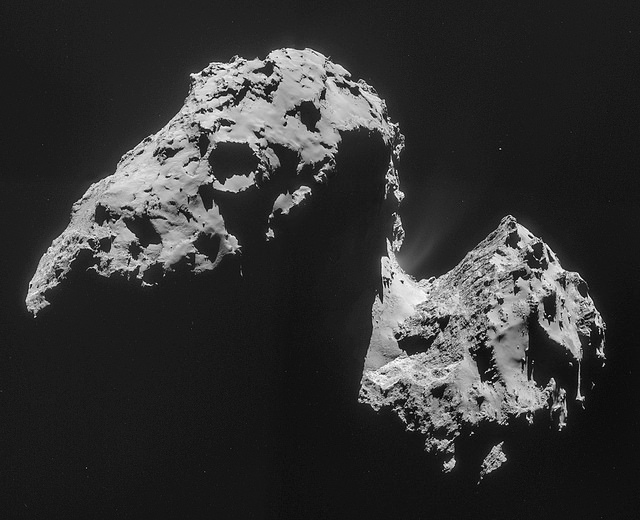Philae May Find Alien Life on Comet Like You May Also Find It in Your Backyard
I mean, anything's possible.

ESA landing a robot on the surface of a comet was a monumental achievement that could teach us a lot about the formation of our solar system and others, but some people just aren’t happy with space until ALIENS. Some UK astrobiologists have suggested that, due to characteristics of Comet 67p, the Philae lander—which has finally woken up again—could be about to find (microbial) aliens, but don’t get too excited; they’re kind of “the boys who cried aliens.”
Astronomer and astrobiologist Prof Chandra Wickramasinghe and his colleague, Dr Max Wallis, believe that comets are likely homes for “extremophiles”—organisms that thrive in extreme environments like some microorganisms here on Earth. Wickramasinghe thinks the rest of the scientific community is too slow to adopt a view of the Universe in which microbial life is widespread, telling The Guardian,
Five hundred years ago it was a struggle to have people accept that the Earth was not the centre of the universe. After that revolution our thinking has remained Earth-centred in relation to life and biology. It’s deeply ingrained in our scientific culture and it will take a lot of evidence to kick it over.
And it should be noted that Wickramasinghe was involved in the planning of the Rosetta mission 15 years ago, but it should also be noted that the mission proceeded without the necessary equipment to search for life on the comet because pretty much everyone else thought that was ridiculous. The Guardian is also quick to mention,
Prof Wickramasinghe’s views are regarded as several steps outside the scientific mainstream. He has previously suggested that the SARS virus arrived to Earth from space and that airborne spores that caused rainfall in Kerala to turn a reddish hue had an extraterrestrial origin.
So before you go trumpeting from the hilltops that we’re about to enter a brand new scientific age in terms of proof that we’re not alone in the Universe, remember to take it with a grain of salt—and not just because Wickramasinghe has some unorthodox views, but also because theories like this didn’t just spring up out of Philae’s data. The idea that life arrived on Earth (and probably other planets out there in the Universe) through organic material and possibly even microbes brought by comet impacts isn’t new, but Wickramasinghe and Dr Max Wallis are making headlines by talking about how data from Philae could support the hypothesis.
It’s not that they’re definitely wrong; it’s just important to manage expectations here. They’re planning on presenting their findings about how the comet’s surface totally means aliens at the Royal Astronomical Society’s National Astronomy Meeting in Llandudno, Wales this week.
—Please make note of The Mary Sue’s general comment policy.—
Do you follow The Mary Sue on Twitter, Facebook, Tumblr, Pinterest, & Google +?
Have a tip we should know? tips@themarysue.com